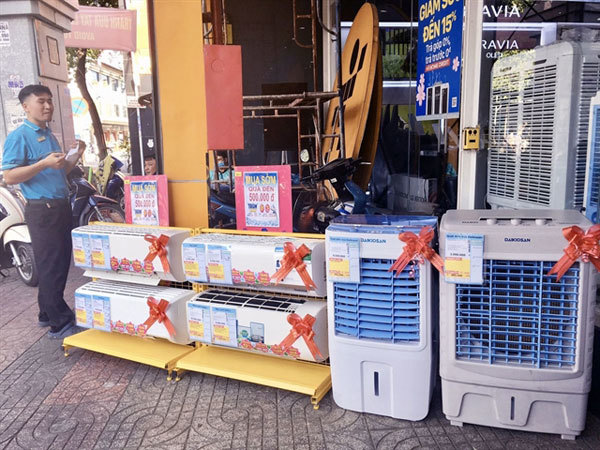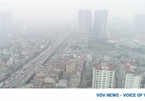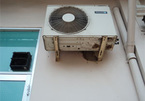 |
| Air-conditioners are sold in a shop in Hanoi. Although environmentally friendly products are introduced in Vietnam, there remains a number of used/expired products which cause harms to the environment. — VNA/VNS Photo Do Phuong Anh |
Nguyen Xuan Tien, vice chairman and general secretary of Vietnam Society of Refrigeration and Air-conditioning Engineers, said that in 2010, more than six million household air-conditioners using R22 were installed in Vietnam, consuming about 6,000 tonnes of the chemical.
There was a lack of understanding of the negative impacts of the refrigerant on the environment and a habit of using used/expired equipment in Vietnam, Tien said, adding that R22 was much cheaper than alternatives like R32 or R410A.
In the last few years, air-conditioner/refrigerator producers shifted to products with R32 or R410A, which helped reduce the number of products with R22, Tien said.
However, Vietnam still lacked policies and financial resources to withdraw, transport, and destroy refrigerants, Tien said.
R22 and hydrofluorocarbons (HFCs) are fluorocarbon gas (F-gas) which could damage the ozone layer.
HFCs are widely used as a refrigerant in household and industrial air conditioners, refrigerators, cleaning precision electronic equipment and spray propellants but they have much higher global warming potential than CO2 and if released, they stay in the atmosphere for decades.
According to a report by the Ministry of Natural Resources and Environment (MONRE), in 2019, HFCs consumption of Vietnam reached 3,772.621 tonnes. In 2020, HFCs consumption topped 6,000 tonnes, mostly R410A, R13a, R404A, R407C and R32.
Meanwhile, Vietnam’s HCFC consumption reached nearly 3,600 tonnes in 2019 and more than 2,585 tonnes in 2020.
Due to changes in the environment law, which was revised in November 2020, Vietnam reconfirmed its commitment in joining the global efforts in combating climate change.
Article 92 of the law set important rules and principles for Vietnam to strictly control the consumption of F-gases to ensure the implementation of the Kigali Amendment to the Montreal Protocol, an international treaty on F-gases, which Vietnam has been an active member of since September 2019.
“Vietnam has been taking steps to phase out all ozone-depleting substances and plans to start phasing down F-gases from 2024,” said Nguyen Dang Thu Cuc, national ozone co-ordinator in MONRE’s Department of Climate Change.
Roadmaps to manage and phase out ozone-depleting substances and greenhouse gases will be developed and implemented under a Government decree.
The decree is set to clarify the national consumption of ozone-depleting substances to bring it in line with the country’s commitments. As a result, a consumption quota would be given to specific industries and sectors.
Cuc said the decree would also facilitate plans for Vietnam to better manage, collect, recycle, reuse, or destroy substances that damage the ozone layer or produce greenhouse gases.
International support
On Wednesday, the Japan International Cooperation Agency (JICA) Vietnam Office and the Department of Climate Change (DCC) under MONRE organised a workshop on 'Exchanging experiences on fluorocarbon gas (F-gas) management'.
The workshop was organised as a part of a 'Survey on promoting the next framework of climate change under the Paris Agreement Rule-book in Vietnam' which JICA has been implementing since July 2020, for Vietnam to exchange experience on F-gas management with countries such as Japan, Australia, Singapore and Malaysia.
At the workshop, speakers from Japan, Australia, Singapore and Malaysia discussed managing F-gases with their Vietnamese counterparts. They agreed that Asian countries need to work together to phase down Hydrofluorocarbons (HFCs), which are common F-gases, to meet the targets set in the Kigali Amendment and contribute to the Paris Agreement.,
“Together with the Initiative on Fluorocarbons Life Cycle Management of the government of Japan which Vietnam agreed to join in October last year, technical analysis on current management of F-gas in Viet Nam by JICA’s Japanese experts will help MONRE in the formulation of specific regulations to control the use and disposal of F-gases,” said Murooka Naomichi, Senior Representative of JICA Vietnam Office.
“We also hope our experiences on using appropriate technologies for recovery and destruction of F-gases are useful for Vietnamese companies when the Government implements strict measures for F-gas management,” he said.
Tang The Cuong, general of DCC, said Article 92 of the revised Law on Environmental Protection provided major responsibilities and requirements for MONRE as the focal point, as well as actions by ministries and relevant stakeholders in phasing out Ozone Depleting Substances and phasing down HFCs.
“Learning from the experiences of Japan and other countries will help us come up with effective HFC control measures and particularly to stimulate the private sector to convert into more environment-friendly technologies,” Cuong said.
VNS

Vietnam strives to control and forecast changes in air quality by 2025
The nation’s target of forecasting changes in air quality is mentioned in the plan put forward by the Ministry of Natural Resources and Environment.

Vietnam to reduce 35% HCFCs consumption by 2024
Vietnam plans to reduce 35 per cent of its Hydrochlorofluorocarbons (HCFCs) consumption by 2024 in an attempt to protect the ozone layer.